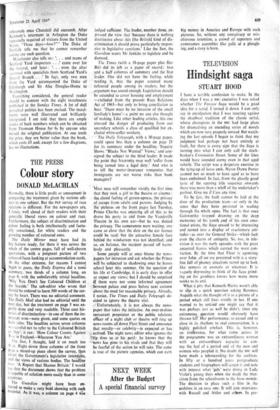Colour story
THE PRESS DONALD McLACHLAN Normally, there is little profit or amusement in comparing the treatment given by various edi- tors to one subject. But the PE.P survey of race relations is different. For the newspapers are, I fancy, well ahead of their readers with their generally liberal views on colour and race. Furthermore, the subject of discrimination and colour feeling is both intellectually and factu- ally sensational, for white readers and the growing number of coloured ones.
The Daily Mirror must have had its big feature ready, for there it was across the whole of the centre pages, full of well-chosen quotations, with a poignant picture of two coloured faces looking at accommodation cards. At the other extreme, for reasons I cannot begin to guess, the Daily Express did a tame summary, two thirds of a column long, on page 6, with the unbelievably trivial headline, 'Why You Don't See Coloured Children at the Seaside.' The sub-editor who wrote that should be ordered to learn 500 words of the sur- vey by heart. There was no editorial comment. The Daily Mail also had no editorial until the next day, but the treatment on page 5 was ex- pertly done and very readable. Three case his- tories of discrimination—in one of them the im- migrant won—were given, and some quotes on both sides. The headline across seven columns Was careful not to refer to the Coloured British as 'they% it ran: 'How Colour Counts Against You in England—Wherever You Are.'
The Sun, I thought, laid it on much too th Right down three columns of the front Page a mixed-up piece about the survey, then about the Government's legislative intentions, and the views of various bodies. The headline was: 'A Report that Shames Britain.' I would say that the document shows that the problem is capable of solution more easily than in sonic- countries.
The Guardian might have been ex- pected to make a very bold showing with such material. As it was, a column on page 4 was judged sufficient. The leader, number three, ex- pressed the view that 'because there is nothing doctrinaire about this [the British] kind of dis- crimination it should prove particularly respon- sive to legislative sanctions.' Like the Sun, the Guardian wants Mr Jenkins to legislate and be damned.
The Times (with a 16-page paper plus Biz- Biz) did its job as a paper of record: two and a half columns of summary and the first leader. One did not have the feeling, while reading it, that the paper counted many 'coloured people among its readers, but the
- „argument was sound enough. Legislation should be extended to cover housing and employment —excluded from the present Race Relations Act of 1965—but only to bring conciliation to bear. 'There must be no invasion of the small landlady's home'—a point no one else thought of making. Like other leading articles, this one stressed the danger of producing from our secondary schools a class of qualified but ex- cluded white-collar workers.
The Daily Telegraph, with a 30-page paper, could spare less than a column on page 21 for its summary under the headline, 'Inquiry Shows "Blacks Not Wanted" Views,' and con- signed the subject to the third leader. It made the point that fraternity may well 'suffer from being turned into a legal duty.' And who is to tell the motor-insurance companies that immigrants are not worse risks than bank managers?
'Most men will remember vividly the first time that they took a girl to the theatre or cinema:
. the elated feeling of grown-upness, the privacy of escape from adults and parents. Judging by the pictures on the front pages last Tuesday, Prince Charles was enjoying all of this as he drove his party to and from the Vaudeville Theatre in his own car—but he was denied the privacy. The cameramen were waiting; one came so close that the date on the car licence could be read; but the attractive female face behind the windscreen was not identified; and so, on balance, the incident passed off harm- lessly and pleasantly.
Some people will at once blame the news- papers for intrusion and ask whether the Prince will be subjected to shadowing once he leaves school later this summer. On the question of his life at Cambridge, it is early days to offer or expect any views; but I should be surprised 1( there were not some informal agreement between palace and press before next autumn about the need for reasonable privacy. Already, I notice, The Times and Daily Telegraph de- cided to ignore the theatre visit.
Unfortunately, it is -not always the news- paper that takes the initiative. An over-zealous restaurant proprietor or the public relations Officer of a night club or theatre will ring up news-rooms all down Fleet Street and announce that royalty—or celebrity—is expected or has _ arrived. The night news editor who ignores the ?tip does so at his peril: he knows that the —hews has gone to his rivals and that they will be fearful of the action he will take. The same is true of the picture agencies, which can earn
big money in America and Europe with such pictures. So, without any conspiracy or mis- chievous intention, a crowd of reporters and cameramen assembles like gulls at a plough- ing, and a story is born.






































 Previous page
Previous page